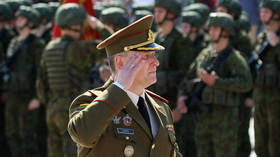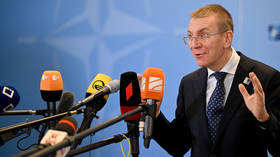
American forces are now ready to “fight immediately,” NATO country’s top general says

Lithuanian Chief of Defense Valdemaras Rupsys in Vilnius, 2019. © Petras Malukas / AFP
The US forces stationed in Lithuania have switched their focus from deterrence of Russia to combat readiness, Lithuanian Chief of Defense Lieutenant General Valdemaras Rupsys said. The country shares a border with Russia’s Kaliningrad exclave on the Baltic Sea, as well as with Belarus and Latvia.
“The main factor used to be deterrence, the demonstration that they were here and could increase our forces at any time,” Rupsys told radio LRT on Friday.
“And now the situation has changed: those units are being deployed so that they can fight immediately. It’s a seamless … transition from one mode to another.”
“At least until 2025, we will have rotating US units that will carry out military training and serve as a factor of deterrence, but also will be ready to carry out defensive actions together with us and other allies,” he added.

Read more
The chief of defense said on Wednesday that he had been assured by the Chairman of the US Joint Chiefs of Staff General Mark Milley that American troops would have “a persistent presence in Lithuania.”
US battalion-size units with around 500 troops, Abrams tanks and Bradley armored vehicles have been stationed on a rotation basis in the eastern Lithuanian city of Pabrade since 2019. NATO also maintains a German-led multinational unit in the country.
The US-led bloc announced the enhancement of its military capabilities in response to Russia’s military operation in Ukraine, which began in February. NATO Secretary General Jens Stoltenberg said in June that the alliance’s rapid-response force would grow from around 40,000 to over 300,000.
Moscow has repeatedly stated that it considers NATO troops near its borders a national security threat. Foreign Minister Sergey Lavrov said on Thursday that the bloc’s actions signify its return to “conceptual priorities” adopted during the Cold War.




